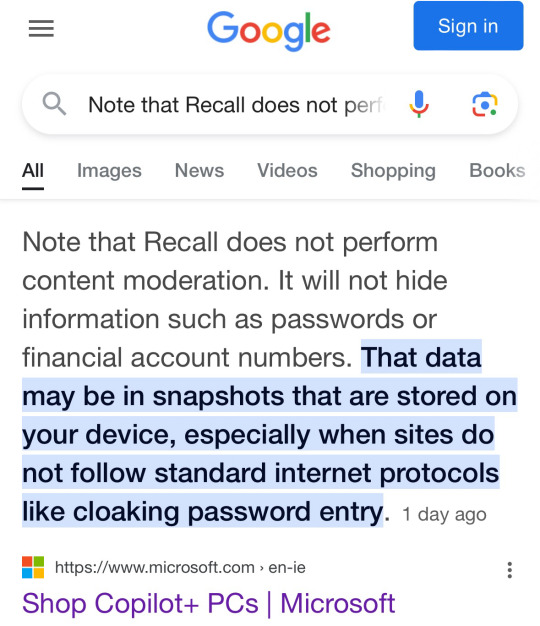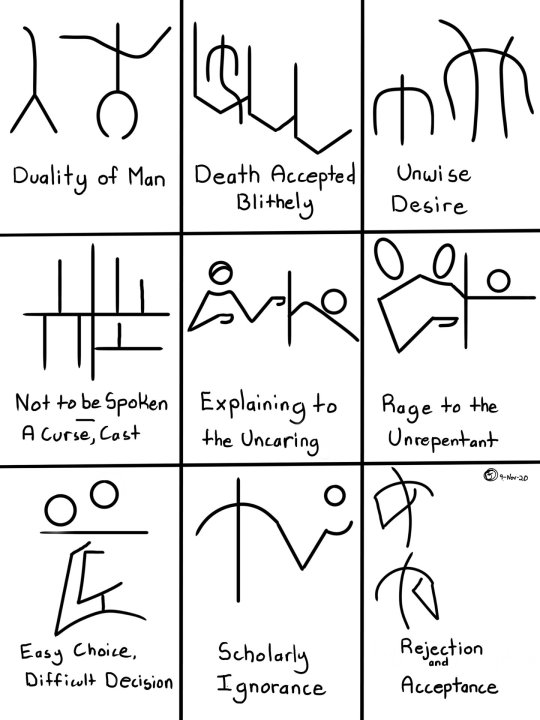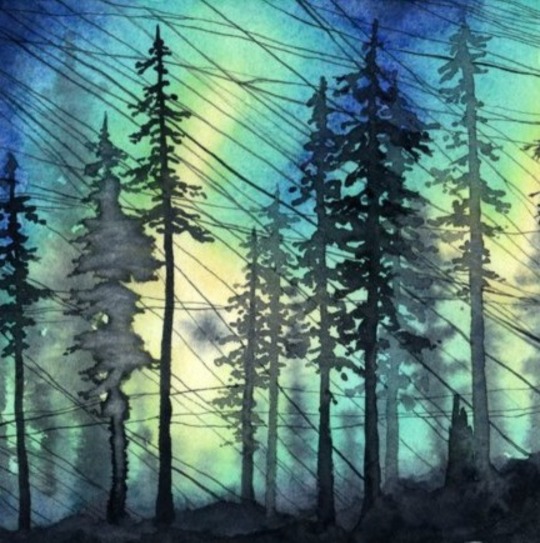Primary acount for @beccatheonewhoflies, @noxthexat and @magicalthoughtsendinterriblefics.
Last active 3 hours ago
Don't wanna be here? Send us removal request.
Text
Literal definition of spyware:

Also From Microsoft’s own FAQ: "Note that Recall does not perform content moderation. It will not hide information such as passwords or financial account numbers. 🤡

252K notes
·
View notes
Text
Don't ever let anybody talk you out of writing or pursuing your passions. Every time you write, you're improving your craft. Every time you read, you're also improving your knowledge of the craft you love. Keep at it, give yourself and your art some grace, and some room to breathe. The only person who can ever stop you from writing is you, and wouldn't that be a shame? You'll never know who might be touched by your work if you give up on it now.
1K notes
·
View notes
Text
How to Write a Character
↠ Start with the basics, because obviously. Name. Age. Gender. Maybe even a birthday if you’re feeling fancy. This is step one because, well, your character needs to exist before they can be interesting. But nobody cares if they’re 27 or 37 unless it actually matters to the story.
↠ Looks aren’t everything… but also, describe them. Yes, we know their soul is more important than their hair color, but readers still need something to visualize. Do they have the kind of face that makes babies cry? Do they always look like they just rolled out of bed? Give us details, not just “tall with brown hair.
↠ Personality isn’t just “kind but tough.” For the love of storytelling, give them more than two adjectives. Are they kind, or do they just pretend to be because they hate confrontation? Are they actually tough, or are they just too emotionally repressed to cry in public? Dig deeper.
↠ Backstory = Trauma (usually). Something shaped them. Maybe it was a messy divorce, maybe they were the middle child and never got enough attention, or maybe they once got humiliated in a spelling bee and never recovered. Whatever it is, make it matter to who they are today.
↠ Give them a goal. Preferably a messy one. If your character’s only motivation is to “be happy” or “do their best,” they’re boring. They need a real goal, one that conflicts with who they are, what they believe in, or what they think they deserve. Bonus points if it wrecks them emotionally.
↠ Make them suffer. Yes, I said it. A smooth, easy journey is not a story. Give them obstacles. Rip things away from them. Make them work for what they want. Nobody wants to read about a character who just gets everything handed to them (unless it’s satire, then carry on).
↠ Relationships = Depth. Nobody exists in a vacuum. Who do they love? Who annoys the hell out of them? Who do they have that messy, can’t-live-with-you-can’t-live-without-you tension with? People shape us. So, shape your character through the people in their life.
↠ Give them a voice that actually sounds like them. If all your characters talk the same, you’ve got a problem. Some people ramble, some overthink, some are blunt to the point of being offensive. Let their voice show who they are. You should be able to tell who’s talking without dialogue tags.
↠ If they don’t grow, what’s the point? People change. They learn things, make mistakes, get their hearts broken, and (hopefully) become a little wiser. If your character starts and ends the story as the same exact person, you just wasted everyone’s time.
↠ Flaws. Give. Them. Flaws. Nobody likes a perfect character. Give them something to struggle with, maybe they’re selfish, maybe they push people away, maybe they’re addicted to the thrill of self-destruction (fun!). Make them real. Make them human.
↠ Relatability is key. Your character doesn’t have to be likable, but they do have to be understandable. Readers need to get them, even if they don’t agree with them. If your character never struggles, never doubts, and never screws up, I have bad news: they’re not a character, they’re a mannequin.
↠ You’re never actually done. Characters evolve, not just in the story, but as you write them. If something feels off, fix it. If they feel flat, dig deeper. Keep refining, rewriting, and letting them surprise you. That’s how you create someone who feels real.
Now go forth and write characters that actually make people feel something. And if you need a reminder, just ask yourself: Would I care if this person existed in real life? If the answer is meh, start over.
#writing#writerscommunity#writer on tumblr#writing tips#writing advice#character development#writer tumblr#writblr
4K notes
·
View notes
Text
Writing Resources List

I use my blog to share writing resources that I’ve collected over the years. I’ve recently gotten some new followers, so I thought I would make a list of many of these resources for easy reference.
(However, this is not a complete list of all the resources I’ve posted. For more writing resources, feel free to check out my blog.)
Encouragement for Writers
Writer’s Block & Procrastination
Writing Your Story’s Plot
How to Write a Scene
Choosing a Setting for Your Story
Character Arc & Character Development
Character Traits
How to Write Heroes & Villains
Elemental Magic & Superpowers
Writing Magic Systems
Fantasy Writing & World-Building
Writing Fight Scenes
Swords and Bows
Writing Mermaids
Writing Relationships & Romance
Romance & Relationship Prompts
+
I’m a writer, poet, and editor. I share writing resources that I’ve collected over the years and found helpful for my own writing. If you like my blog, follow me for more resources! ♡
4K notes
·
View notes
Text
20 Ways to Show Extreme Fear in Your Writing
As I dive into researching signs of fear for my horror WIP, I wanted to share some of the most compelling and visceral reactions I’ve come across. Whether you’re writing a chilling scene or crafting a character’s panic, these 20 signs of fear can help bring tension and realism to your story.
Physical Reactions
Hyperventilating — sucking in air but never feeling like it’s enough
Chest tightens — feels like a weight or hands pressing down
Limbs shaking violently, knees buckling
Complete loss of muscle control — collapsing or unable to stand
Cold sweat soaking through clothes
Heart hammering so hard they feel it in their throat or head
Tunnel vision — the world narrowing down to one terrifying focal point
Ringing in the ears or sudden deafness, like the world drops away
Dizziness / feeling faint / vision blurring
Dry mouth — unable to speak or even scream
Uncontrollable Behavior
Screaming / sobbing / gasping — involuntary vocal outbursts
Panic run — bolting without thinking, tripping over everything
Clawing at their own skin / chest / throat — like trying to escape their body
Begging / pleading out loud even if no one’s there
Repeating words or phrases — “No, no, no” / “This isn’t happening”
Hiding instinctively — diving under tables, closets, or corners
Desperate grabbing — reaching for someone, anything solid
Loss of bladder or bowel control (for extreme terror)
Total mental shutdown — frozen, slack-jawed, staring blankly
Memory blackout — later can’t recall what happened during the worst moment
#writing tips#writing advice#character development#writers on tumblr#writeblr#creative writing#fiction writing#writing
12K notes
·
View notes
Text
Character Flaws and Their Meanings
Impulsiveness : Acts on instinct without careful planning. Perfectionism : Sets unrealistically high standards, leading to self-criticism. Indecisiveness : Struggles to commit to decisions or choose a path. Arrogance : Overestimates one’s abilities and dismisses others. Pessimism : Habitually expects negative outcomes in most situations. Cynicism : Distrusts the motives and sincerity of others. Overconfidence : Places excessive faith in one’s skills, often underestimating risks. Stubbornness : Resists change and refuses to adapt to new ideas. Jealousy : Feels envious of others' success or possessions. Insecurity : Experiences frequent self-doubt and a lack of confidence. Procrastination : Tends to delay tasks, often leading to missed opportunities. Passivity : Avoids taking initiative and relies on others to act. Aggressiveness : Responds with hostility or force rather than reason. Selfishness : Prioritizes personal gain over the welfare of others. Fragility : Is overly sensitive to criticism and easily discouraged. Egotism : Constantly focuses on oneself and one’s own importance. Defensiveness : Quickly rejects or rationalizes away critique or new information. Manipulativeness : Exploits others to fulfill personal needs or desires. Recklessness : Shows a careless disregard for potential risks or consequences. Resentfulness : Holds lingering bitterness and grudges over perceived wrongs. Distractibility : Finds it hard to maintain focus amid competing interests. Impatience : Lacks the willingness to wait, often spoiling opportunities to learn. Perfunctory : Performs actions in a mechanical, uninspired manner. Self-Doubt : Consistently questions personal abilities and decisions. Arbitraryness : Makes decisions based on whim rather than reason or evidence. Rigidity : Is inflexible and unwilling to consider alternative viewpoints. Gullibility : Trusts too easily, often leading to being misled or deceived. Obsession : Becomes excessively fixated on particular ideas or details. Aloofness : Maintains emotional distance, appearing detached or indifferent. Intolerance : Refuses to accept differing perspectives or lifestyles.
Writing Advice for Brainstorming
Mix genres and time periods: Experiment by combining elements from different eras or genres to create unique settings and narratives.
Use "what if" scenarios: Pose unexpected questions (e.g., What if time travel operated on emotions rather than mechanics?) to spark novel ideas.
Draw from diverse mediums: Engage with art, music, or even scientific papers to inspire unexpected plot twists.
Embrace absurdity: Let illogical or surreal ideas guide you; sometimes the wildest thoughts lead to compelling stories.
Reverse clichés: Identify common tropes in your favorite genres and deliberately invert them to create fresh perspectives.
Incorporate personal anomalies: Transform your idiosyncrasies and personal struggles into rich, multi-dimensional characters.
Use mind-mapping: Visually plot your ideas in a freeform way to uncover hidden connections between disparate elements.
10K notes
·
View notes
Text
Writing with Colors

A list of resources to help you describe different colors in your writing.
The Color Thesaurus A collection of infographics that show various shades of different colors, each shade/color labeled by name.
Color Reference Chart Another collection of infographics that show various shades of different colors, each shade/color labeled by name.
Hair Color Reference Chart A collection of infographics that show various shades of different hair colors, each shade/color labeled by name.
Eye Color Reference Chart A collection of infographics that show various shades of blue, brown, and green eye colors, each shade/color labeled by name.
Different Ways to Describe Hazel Eyes A list of ideas and suggestions for describing hazel eyes. Can be used as prompts or for brainstorming.
Different Ways to Describe Green Eyes A list of ideas and suggestions for describing green eyes. Can be used as prompts or for brainstorming.
Different Ways to Describe Blue Eyes A list of ideas and suggestions for describing blue eyes. Can be used as prompts or for brainstorming.
Different Ways to Describe Brown Eyes A list of ideas and suggestions for describing brown eyes. Can be used as prompts or for brainstorming.
+
I’m a writer, poet, and editor. I share writing resources that I’ve collected over the years and found helpful for my own writing. If you like my blog, follow me for more resources! ♡
7K notes
·
View notes
Photo

“A collection of common glyphs of the poorly understood Memeorite civilization of the Second Silicon Age. Memeorite glyphs possess multiple conflicting interpretations and a complexity of meaning impossible to capture in a few short words. These are rough translations only.”
Source: https://twitter.com/beach_fox/status/1325668490431246336 (which include more “memeorite glyphs”
225K notes
·
View notes
Text
Make google sheets automatically calculate your character’s age!
I like using google sheets for story data like this and maybe you do too so here’s a simple way to make your life a lot easier. Plus it automatically updates itself if you change one of the dates for whatever reason.
You can also have it tell you how old your character is on any date, or really, the difference in time between any two dates you want.
Formula and explanation is below the cut.
=DATEDIF(Startdate, Enddate, "Y") & " Years " & DATEDIF(Startdate, Enddate, "YM") & " Months " & DATEDIF(Startdate, Enddate, "MD") & " Days"
Basic format. What you change is in red and green. Here’s an example:
=DATEDIF(B2,C2, "Y") & " Years " & DATEDIF(B2,C3, "YM") & " Months " & DATEDIF(B2,C2, "MD") & " Days"
You will probably skip B1, C1 because that’s usually your header row, as well as column A because that will likely be where your character’s name goes. Just copy and paste the whole formula into the first cell of a new column you want to spit out the age (date difference).
Delete all three instances of B2 and type in or click on the cell that has the start/birthdate for that character, then do the same with C2 but input the enddate.
If you just want the year and month, use this one.
=DATEDIF(Startdate, Enddate, "Y") & " Years " & DATEDIF(Startdate, Enddate, "YM") & " Months "
This one gives you just the year.
=DATEDIF(Startdate, Enddate, "Y") & " Years "
You can also erase “ Years ” at the end if you just want it to display 45 instead of 45 years
After you enter it in once, google sheets should guess the pattern (simply moving down the same column) and all you have to do is click formula cell once, then click and hold the bottom right corner where a dot will appear, and drag it down as far down the column as you need it to go.
Also, if you want your date columns to automatically format a specific way, do this:
Click the top of the column so that it highlights everything beneath it.
At the top hit Format
Hover over Number
Sidemenu will expand and towards the bottom click custom date and time formats
It will give you various options. Pick whichever one you like. You can fiddle with the up and down arrows by Month Day and Year to further customize it
Click apply
Now even if you type out “jan 3 1997” it will automatically change it to “January 3, 1997” or “01-03-1997” or “1/3/97” etc.
You also might need to freeze your header row for it to work properly. Right click on the 1 next to the header row, and all the way at the bottom it says view more row actions, click freeze up to row 1.
22 notes
·
View notes
Text
How To Amplify Your Magick

✵Accept That You Do Not Know: It's okay to not have all the answers. You don't have to be certain all of the time. Magick is the realm of the unknown. If it was ultimately knowable, then science would have already measured and verified it. On the other hand, things that would have once been considered magick are now common technology. So, there is a spectrum from useless knowledge to solid fact. It's up to you to decide which is which and keep a sharp, critical mind.
✵Think For Yourself: Anything that someone else has figured out , you can figure out too. The human mind's potential is illimitable. But we are continually duped into believing that we can't do it, that someone else should do it for us. Unless you're ready to think for yourself, you'll end up as a fake, or worse, someone else's pawn.
✵Keep An Open Mind: You have to be open to new ideas. An open mind is half closed, so they say. A door that is half closed is still open, and it's much the same with the mind. Don't accept as truth anything you hear, only accept the possibility that it may be. You'll have to rigorously seek out truth for yourself with a critical mind. The emphasis on truth is essential. Illusion is based on deceit, real magick on truth.
✵Reduce Your Assumptions: An assumption is basically just a guess. We make a lot of guesses in life from if gods exist to whether the floor will be there when we get out of bed in the morning. Guessing is a psychological reflex and its unlikely that we can ever fullybe free from it. The more you can manke conscious your unconscious assumptions, the more you will notice strange and magickal things about yourself, others, and the Universe.
✵Judge Not: Judgment of others clouds your awareness. Like assumption, it's a reflex. Try reserving judgment when you can. Allow yourself the patience the gather more knowledge and insight into matters. If someone seems like an idiot, ask them genuine questions. Get experience with why others think and act the way they do. Whenever you avoid judging others, you can gain wisdom.
✵Shed Expectations: Another habitual block to your magickal potential is your expectations. Our imagination is always in use, whether consciously or unconsciously. Things are going to be as they are, whether you like it or not. The thing about expectation is that people see not what they want to see, but instead what they expect to see. Projecting our image of things on the present moment or into the future is an unnecessary expenditure of energy that can be freed for authentic magickal experience.
✵Stop Labeling Everything: What is our obsession with classifying things? As soon as we have a word or a name for something, we believe that we understand what that thing is. We can't help this, it's just how our minds work. Try to notice when you are doing this. Naming can be a very powerful magickal act, but only if it's conscious. Habitual labeling will actually end up as an obstacle to true understanding.
✵Surrender To What Is: This is about allowing the present moment to just be. We tend to believe that the present is similar to the future, in that we can change it. But the present is more like the past, in that once it's here, it's here, real and unalterable. If you don't accept that, accept that you can't accept it. Look at what is around you and see that is is how it is.
✵Cultivate Courage: Courage is essential in many traditions, and the Universe rewards courage with 'Hamingja', a form of luck or charisma. It goes by many names in many traditions, but the basis is simply that courageous acts are rewarded by the Universe. Start small and work your way up. You may not br able to start with your ultimate fears, but tackle what you can and you will get there in time. The more courage you possess, the greater your magickal ability.
✵Trust The Universe: If you only have faith in one thing, have faith in this... Ultimately this Universe is here for you to learn what you must learn, to face what you must face, and to allow you to find enlightenment. It's not out to get you, quite the opposite. Enthusiasm and playfulness are two of the strongest mindsets with which we can engage in our exploration of magick. Go with thr flow!
✵Meditate: Meditation can be very simple. Sit up straight, focus on your breathing, and the feeling of your life force. Connect with yourself. It will help you master your mind and achieve grounded clarity.
✵Put It Into Action: You can read all the books, attand all the lectures, join all the groups, and talk on and on about magick, but in the end, nothing will happen unless you find some practical means to put it into action. Don't just think, do. Manifest your desires by practicing and experimenting. Learn through trial and error and it will be more valuable and powerful than anything anyone can tell you.

263 notes
·
View notes
Text
A Manifesto Of Apocalyptic Witchcraft

1. If the land is poisoned, then witchcraft must respond.
2. It is not our way if life, it is life itself which is under threat.
3. Witchcraft is our intimate connection to the web of life.
4. We are the Witchcraft.
5. Our World has forever changed. The trodden paths no longer correspond. Witchcraft thrives in this liminal, lunar, trackless realm.
6. We are storm, fire and flood.
7. We will not be denied.
8. Witchcraft is the recourse of the dispossessed, the powerless, the hungry and the abused. It gives heart and tongue to stones and trees. It wears the rough skin of beasts. It turns on a civilization that knows the price of everything and the value of nothing.
9. If you have no price you cannot be bought. If you do not want you cannot be bribed. If you are not frightened you cannot be controlled.
10. Witchcraft is folk magic, the magic of the people and for the people.
11. We call an end to the pretence of respectability.
12. We will not disarm ourselves.
13. The war is upon us.
14. Choose then to become a Mask.
15. Those with nothing left to lose will dare all.
16. There is one Witchcraft under many names. There is one Grand Sabbat on one mountain. There are many ways to fly. There is no witness present at the Sabbat.
17. Witchcraft is a force, not an order. Witchcraft is rhizomatic, not hierarchic. Witchcraft defies organisation, not meaning. We simply bear the marks.
18. Witchcraft is power and possesses this in ekstasis, sex and ordeal.
Witchcraft is unbridled sexuality.
19. In witchcraft it is the woman who initiates. We challenge man to be the equal of this woman.
20. Witchcraft is the art of inversion.
21. Witchcraft is the beauty which is terror.
22. Witchcraft is a myth, which drawing on the past, clothes itself in the symbols of (its) time.
Witchcraft does not mistake myths for history, it harnesses them to transform the future.
Witchcraft knows the ground upon which it stands.
23. Witchcraft honours the spirits. Witchcraft enchants for the lost. Witchcraft will not forget.
24. Witchcraft embodies our ancestors and saints, they carry us with them.
25. To Her is offered the blood, to use the care of the ask and bones.
26. The example we follow is our own.
27. The practice of witchcraft is one of revolution and of the power of woman.
28. The Goddess who speaks through us is known among men as Babalon.
29. Witchcraft concerns itself with mystery. Through the gates of mystery we come to knowledge. Knowledge enters us through the body. The highest form of this knowledge is Love.
30. Every drop of blood is sacrificed to the grail. Love cannot be bought with any other coin.
31. We seek and drink this wine together.
32. Will is finite, passion infinitely renewed.
33. Witchcraft is present, its is ensanguined and vivified. Witchcraft is prescient, it gazes on the future. Witchcraft is oracular, it will not hold its tongue.
Our time has come.

121 notes
·
View notes
Text
it's always so fascinating and heartbreaking when a character in a story is simultaneously idolized and abused. a chosen prophet destined for martyrdom. a child prodigy forced to grow up too fast. a powerful warrior raised as nothing but a weapon. there's just something so uniquely messed up about singing someone's praises whilst destroying them.
149K notes
·
View notes
Text
100 Dialogue Tags You Can Use Instead of “Said”
For the writers struggling to rid themselves of the classic ‘said’. Some are repeated in different categories since they fit multiple ones (but those are counted once so it adds up to 100 new words).
1. Neutral Tags
Straightforward and unobtrusive dialogue tags:
Added, Replied, Stated, Remarked, Responded, Observed, Acknowledged, Commented, Noted, Voiced, Expressed, Shared, Answered, Mentioned, Declared.
2. Questioning Tags
Curious, interrogative dialogue tags:
Asked, Queried, Wondered, Probed, Inquired, Requested, Pondered, Demanded, Challenged, Interjected, Investigated, Countered, Snapped, Pleaded, Insisted.
3. Emotive Tags
Emotional dialogue tags:
Exclaimed, Shouted, Sobbed, Whispered, Cried, Hissed, Gasped, Laughed, Screamed, Stammered, Wailed, Murmured, Snarled, Choked, Barked.
4. Descriptive Tags
Insightful, tonal dialogue tags:
Muttered, Mumbled, Yelled, Uttered, Roared, Bellowed, Drawled, Spoke, Shrieked, Boomed, Snapped, Groaned, Rasped, Purred, Croaked.
5. Action-Oriented Tags
Movement-based dialogue tags:
Announced, Admitted, Interrupted, Joked, Suggested, Offered, Explained, Repeated, Advised, Warned, Agreed, Confirmed, Ordered, Reassured, Stated.
6. Conflict Tags
Argumentative, defiant dialogue tags:
Argued, Snapped, Retorted, Rebuked, Disputed, Objected, Contested, Barked, Protested, Countered, Growled, Scoffed, Sneered, Challenged, Huffed.
7. Agreement Tags
Understanding, compliant dialogue tags:
Agreed, Assented, Nodded, Confirmed, Replied, Conceded, Acknowledged, Accepted, Affirmed, Yielded, Supported, Echoed, Consented, Promised, Concurred.
8. Disagreement Tags
Resistant, defiant dialogue tags:
Denied, Disagreed, Refused, Argued, Contradicted, Insisted, Protested, Objected, Rejected, Declined, Countered, Challenged, Snubbed, Dismissed, Rebuked.
9. Confused Tags
Hesitant, uncertain dialogue tags:
Stammered, Hesitated, Fumbled, Babbled, Mumbled, Faltered, Stumbled, Wondered, Pondered, Stuttered, Blurted, Doubted, Confessed, Vacillated.
10. Surprise Tags
Shock-inducing dialogue tags:
Gasped, Stunned, Exclaimed, Blurted, Wondered, Staggered, Marvelled, Breathed, Recoiled, Jumped, Yelped, Shrieked, Stammered.
Note: everyone is entitled to their own opinion. No I am NOT telling people to abandon said and use these. Yes I understand that said is often good enough, but sometimes you WANT to draw attention to how the character is speaking. If you think adding an action/movement to your dialogue is 'good enough' hate to break it to you but that ruins immersion much more than a casual 'mumbled'. And for the last time: this is just a resource list, CALM DOWN. Hope that covers all the annoyingly redundant replies :)
Looking For More Writing Tips And Tricks?
Check out the rest of Quillology with Haya; a blog dedicated to writing and publishing tips for authors!
Instagram Tiktok
#writing community#writing tools#writer things#writing advice#writer community#writing techniques#writing prompt#writing stuff#creative writing#ya writing advice#writing tips and tricks#writer tools#writers of tumblr#writer blog#writers block#writers on tumblr#writer stuff#author#writing inspiration#writeblr#novel writing
34K notes
·
View notes
Text

This is the magic lucky word count. Reblog for creativity juice. It might even work, who knows.
57K notes
·
View notes
Text
10 Non-Lethal Injuries to Add Pain to Your Writing
New Part: 10 Lethal Injury Ideas
If you need a simple way to make your characters feel pain, here are some ideas:
1. Sprained Ankle
A common injury that can severely limit mobility. This is useful because your characters will have to experience a mild struggle and adapt their plans to their new lack of mobiliy. Perfect to add tension to a chase scene.
2. Rib Contusion
A painful bruise on the ribs can make breathing difficult, helping you sneak in those ragged wheezes during a fight scene. Could also be used for something sport-related! It's impactful enough to leave a lingering pain but not enough to hinder their overall movement.
3. Concussions
This common brain injury can lead to confusion, dizziness, and mood swings, affecting a character’s judgment heavily. It can also cause mild amnesia.
I enjoy using concussions when you need another character to subtly take over the fight/scene, it's an easy way to switch POVs. You could also use it if you need a 'cute' recovery moment with A and B.
4. Fractured Finger
A broken finger can complicate tasks that require fine motor skills. This would be perfect for characters like artists, writers, etc. Or, a fighter who brushes it off as nothing till they try to throw a punch and are hit with pain.
5. Road Rash
Road rash is an abrasion caused by friction. Aka scraping skin. The raw, painful sting resulting from a fall can be a quick but effective way to add pain to your writing. Tip: it's great if you need a mild injury for a child.
6. Shoulder Dislocation
This injury can be excruciating and often leads to an inability to use one arm, forcing characters to confront their limitations while adding urgency to their situation. Good for torture scenes.
7. Deep Laceration
A deep laceration is a cut that requires stitches. As someone who got stitches as a kid, they really aren't that bad! A 2-3 inch wound (in length) provides just enough pain and blood to add that dramatic flair to your writing while not severely deterring your character.
This is also a great wound to look back on since it often scars. Note: the deeper and wider the cut the worse your character's condition. Don't give them a 5 inch deep gash and call that mild.
8. Burns
Whether from fire, chemicals, or hot surfaces, burns can cause intense suffering and lingering trauma. Like the previous injury, the lasting physical and emotional trauma of a burn is a great wound for characters to look back on.
If you want to explore writing burns, read here.
9. Pulled Muscle
This can create ongoing pain and restrict movement, offering a window to force your character to lean on another. Note: I personally use muscle related injuries when I want to focus more on the pain and sprains to focus on a lack of mobility.
10. Tendonitis
Inflammation of a tendon can cause chronic pain and limit a character's ability to perform tasks they usually take for granted. When exploring tendonitis make sure you research well as this can easily turn into a more severe injury.
This is a quick, brief list of ideas to provide writers inspiration. Since it is a shorter blog, I have not covered the injuries in detail. This is inspiration, not a thorough guide. Happy writing! :)
Looking For More Writing Tips And Tricks?
Check out the rest of Quillology with Haya; a blog dedicated to writing and publishing tips for authors!
Instagram Tiktok
#writing community#writing tools#writer things#writing advice#writer community#writing techniques#writing prompt#writing stuff#creative writing#ya writing advice#writing tips and tricks#writer tools#writers of tumblr#writer blog#writers block#writers on tumblr#author help#author advice#author#writing inspiration#writeblr#novel writing
64K notes
·
View notes










